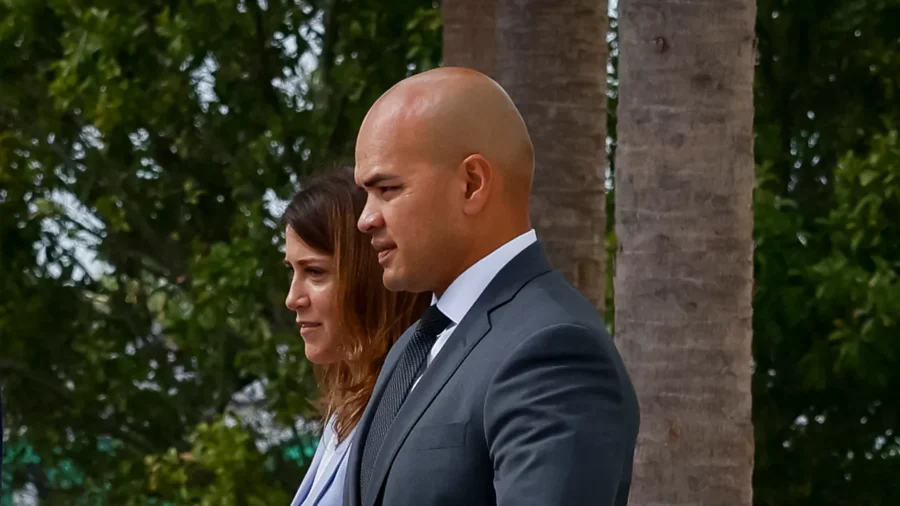The federal judge presiding over former President Donald Trump’s classified documents case in Florida on Thursday denied several pre-trial motions to dismiss filed by codefendants Walt Nauta and Carlos De Oliveira.
The motions sought various forms of relief, including the dismissal of charges and requests for additional information regarding the allegations against them.
However, U.S. District Judge Aileen Cannon, following a two-hour hearing on the motions on April 12, ruled against the defendants in an order issued on Thursday.
Mr. Nauta, a former valet to President Trump, was charged in June 2023 with six counts related to concealing classified documents stored at the former president’s Mar-a-Lago estate in Florida. Mr. de Oliveira, a property manager for the estate, was added as a codefendant about a month later and accused of helping delete security footage of boxes of classified documents being moved.
They have both pleaded not guilty, and last week they filed separate motions to dismiss or for a bill of particulars, claiming the prosecution hadn’t made their charges clear enough.
In her Thursday order denying their motions, Judge Cannon addressed the arguments made in three specific motions brought by the defendants, which she noted were better made at trial.
De Oliveira’s Motions
Mr. de Oliveira’s motion to dismiss or for a bill of particulars argued for the tossing of obstruction offenses and requested additional details to specify the charges. He also argued that the allegations don’t show that he was capable of acting with the required “corrupt” criminal intent to warrant the alleged obstruction offenses.
However, Judge Cannon found that the arguments presented did not warrant dismissal. She noted that many of the arguments raised in the motions as grounds for dismissal were better made at trial, where the burden of proof would be on special counsel Jack Smith.
She noted that Mr. de Oliveira’s arguments spoke to topics and allegations not contained in the superseding indictment, specifically regarding allegations about his knowledge of classified documents, the contents of “the boxes” in general, or his knowledge of an “official proceeding.”
“These characterizations are not grounds to dismiss the obstruction counts against De Oliveira. He does not meaningfully dispute that the charging document satisfies the minimum pleading standards accepted by the Eleventh Circuit,” Judge Cannon wrote, “and it does.”
The judge noted that the obstruction counts “track” the language of the statute and the indictment provides “sufficient details to enable De Oliveira to prepare a defense, to apprise him of the charged offenses, and to rely upon any subsequent judgment as a bar against double jeopardy.”
“Any particular challenges to the Special Counsel’s evidentiary showing can be made at trial, where the Special Counsel will bear the entire burden of proof as to all essential elements of the obstruction offenses,” she added.
She denied the motions to dismiss his two other counts, including for a bill of particulars, “for similar reasons.”
While the indictment doesn’t contain “additional details” about Mr. de Oliveria’s “specific knowledge” of grand jury proceedings or the grand jury subpoena, the judge found it to be sufficient.
“The Special Counsel is not required to plead or provide more specificity in the form of a bill of particulars,” she wrote.
Nauta’s Motions
Similar to Mr. de Oliveira’s motion, Mr. Nauta sought clarification about certain aspects of the allegations against him in a motion to dismiss or for a bill of particulars.
Judge Cannon denied this motion, stating that the indictment provided sufficient information for Mr. Nauta to prepare for trial.
Mr. Nauta asked the court for clarity about which boxes were allegedly concealed, moved, or searched during the FBI raid of Mar-a-Lago on Aug. 8, 2022.
Additionally, he wanted to know whether the searched boxes were among the 34 that he was accused of concealing on June 2, 2022.
Furthermore, he sought clarity about whether any of the allegedly moved boxes contained documents marked classified and which of the seized boxes were the boxes allegedly moved by Mr. Nauta containing classified material.
“Although there is reason to understand the request for additional specificity as to the ‘boxes’ and their ‘contents,’ even in light of the lengthy Indictment, the Special Counsel is not legally obligated to provide more detail,” Judge Cannon wrote. “The Court cannot say that the Indictment as a whole lacks sufficient information to assist Nauta in preparing for trial, and the discovery provided in this case is exceedingly voluminous.”
Mr. Nauta also challenged the constitutionality and clarity of the obstruction counts against him, arguing they were vague and failed to state an offense.
Despite acknowledging the complexities surrounding the term “corruptly,” with case law providing a “menu of formulations” for the term, Judge Cannon ultimately rejected Mr. Nauta’s arguments, citing existing legal precedent and the adequacy of the allegations in the indictment.
“This ‘multiple-meanings-vagueness’ contention is worthy of serious consideration, but it does not lead this Court to conclude that dismissal of the obstruction counts is warranted,” she wrote.
“Notwithstanding these reasonable questions about the definition of the term ‘corruptly,’ Nauta’s as-applied vagueness challenge fails under existing law,” she added.
Mr. Nauta’s arguments to dismiss for failing to state a claim were dismissed for “similar reasons,” the judge noted.
The Epoch Times contacted Mr. Nauta’s and Mr. de Oliveria’s attorneys for comment.
During the April 12 hearing, the court heard arguments on the need for continued sealing of specific grand jury materials.
In a separate order on Thursday, the judge ordered Mr. Nauta to redact certain information from his grand jury testimony transcript taken on June 21, 2022, that identify witnesses, and publicly file it by April 24.
Mr. Smith was directed in the same order to file a status report under seal detailing the “landscape” of grand jury materials and proceedings implicated in the case by April 26.
The order also outlined a schedule for the defense to respond to the status report.
From The Epoch Times


